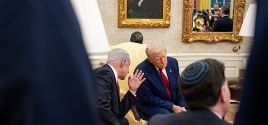TSA's Failure Based On The Myth Of Perfect Securityby Mike MasnickTechdirt Nov. 25, 2010 |
Popular 
Ben Shapiro, Mark Levin and Laura Loomer Warn of Foreign Influence... From Qatar

NYT: Trump Ended War With Houthis After They Shot Down U.S. Drones, Nearly Hit Fighter Jets

Eloy Adrian Camarillo, 17, Arrested in Shooting Death of Infowars Reporter Jamie White

Trump Advisor to Washington Post: 'In MAGA, We Are Not Bibi Fans'

Trump Cut Off Contact With Netanyahu Over 'Manipulation' Concerns, Israeli Reporter Claims
 As the complaints against the TSA ratchet up, various people are finally starting to point out why the whole concept of security theater is a farce. The entire setup is based on the idea that you can have "perfect security." But, if you wanted perfect security, the only way to do that is to not let anyone fly, ever. As James Fallows notes it doesn't make much sense to "spend limitlessly toward the impossible end of reducing the risk to zero." As he notes: Every society accepts some risks as part of its overall social contract. People die when they drive cars, they die when they drink, they die from crime, they die when planes go down, they die on bikes. The only way to eliminate the risks would be to eliminate the activities -- no driving, no drinking, no weapons of any kind, no planes or bikes. While risk/reward tradeoffs vary between, say, Sweden and China, no nation accepts the total social controls that would be necessary to eliminate risk altogether.Along those lines, the Unqualified Offerings blog (via Julian Sanchez) does a nice job explaining how the incentives line up to create this ridiculous situation. Basically, he notes that a terrorist attack on an airplane will happen. Some day. No matter what we do to try to prevent it. But once that happens, the response is going to be obvious: those who pushed hard for more ridiculous security theater that wasn't implemented will keep their jobs and retain power. Those who pushed for more reasonable solutions will be vilified. 100% success is usually impossible in the real world. Given that eventually, one way or another, a terrorist will almost certainly take down a plane, the only question that management has to ask itself is what position they want to be in when that happens. And that answer is simple: Safe in their jobs, and poised to inherit a bigger budget.And that's why we get security theater. The goal isn't so much actual safety. After all, as Jim Harper notes, if you look at the actual "risk" of a terrorist attack on an airplane today, it's pretty close to zero. But the whole process is built around trying to bring it all the way to zero, which is an impossibility, but leads to ridiculous extremes. And, he notes, this is exactly how the terrorists planned it: This is apostasy in Washington -- where the political imperative is zero risk. But risk is a reality of life. We take risks when we drive, when we walk across a street and when we go to the fridge for that two-day-old slice of pizza. |



